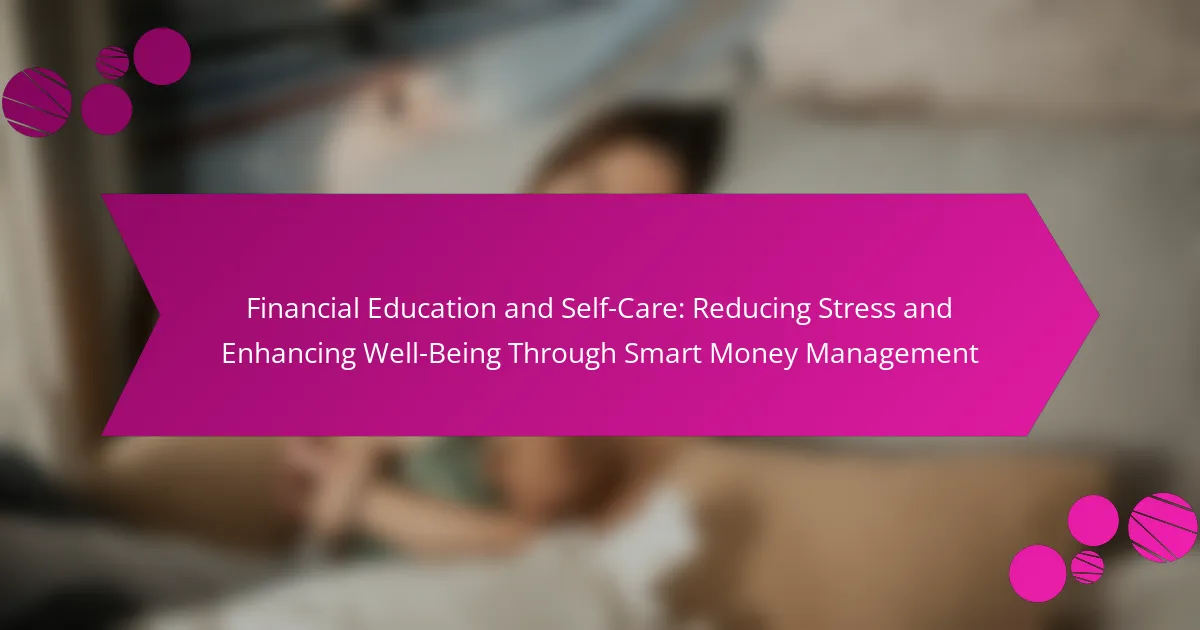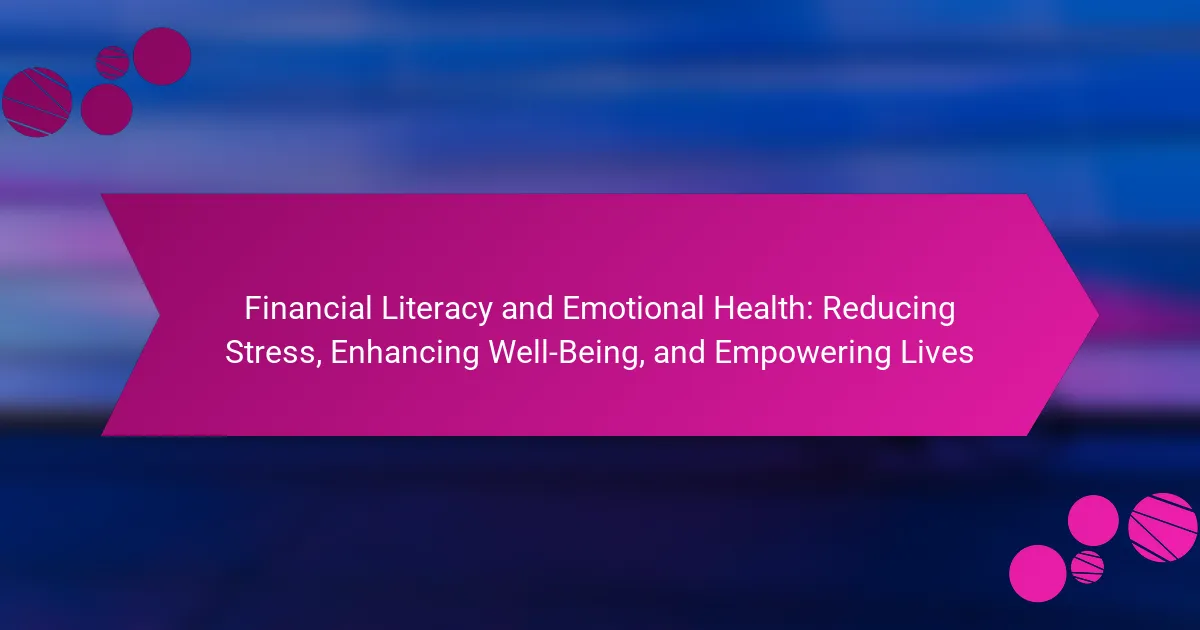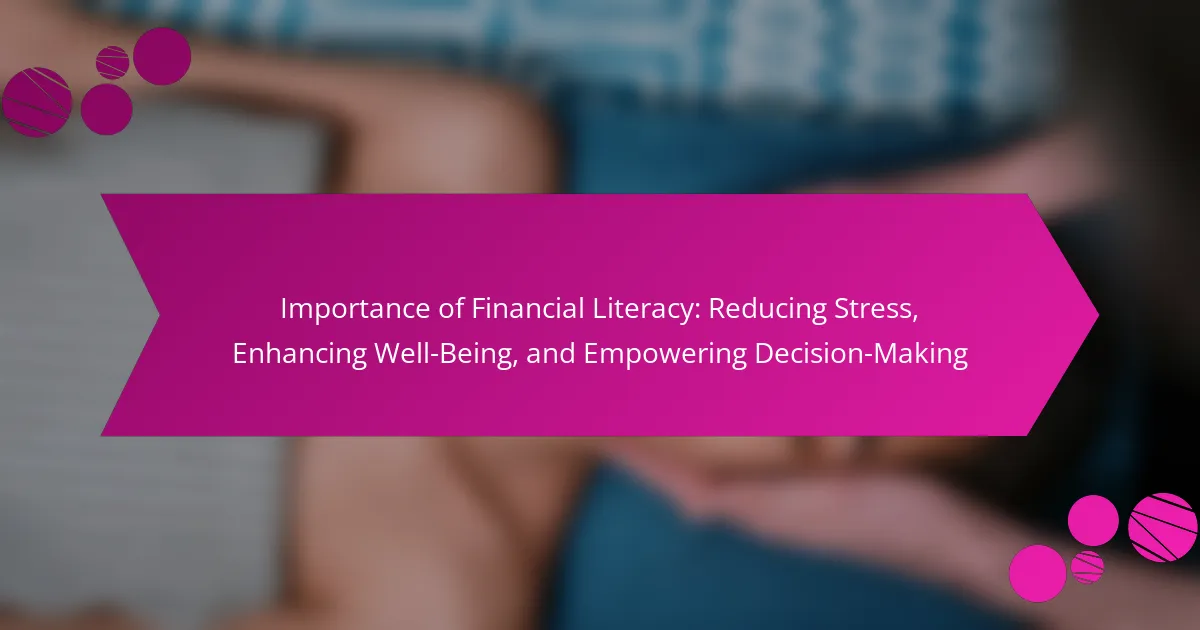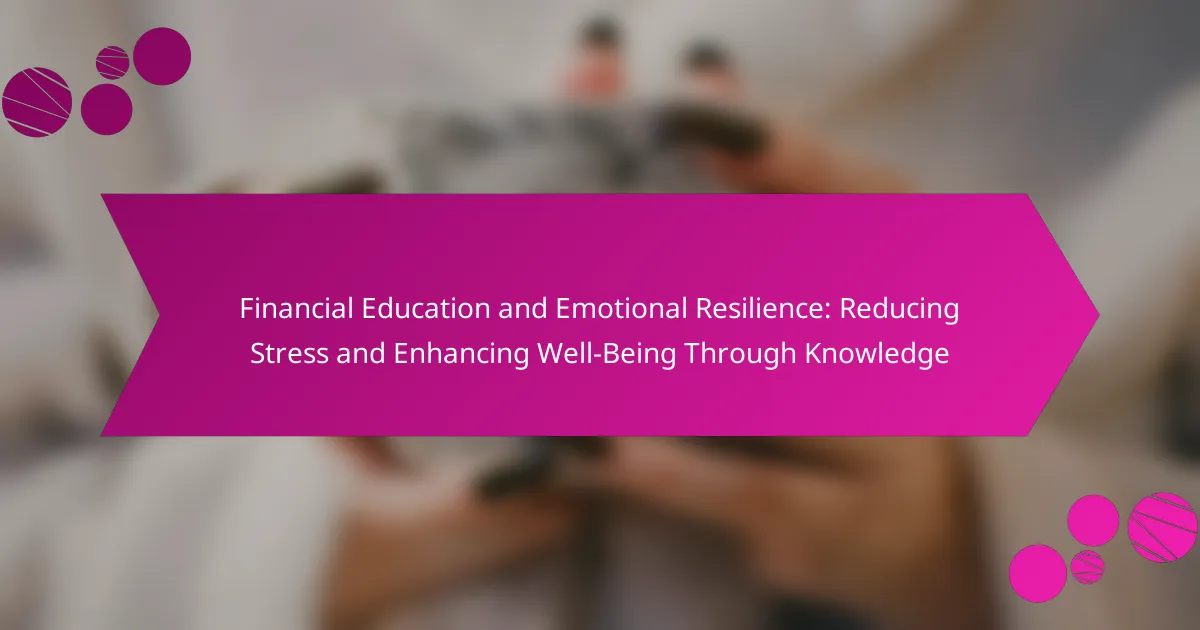Financial literacy significantly reduces financial stress and enhances emotional well-being. It empowers individuals to make informed decisions, leading to improved financial stability and lower anxiety levels. Emotional intelligence is fostered through financial education, promoting resilience and better interpersonal relationships. Practical steps, such as setting financial goals and creating a budget, further enhance knowledge and emotional awareness.
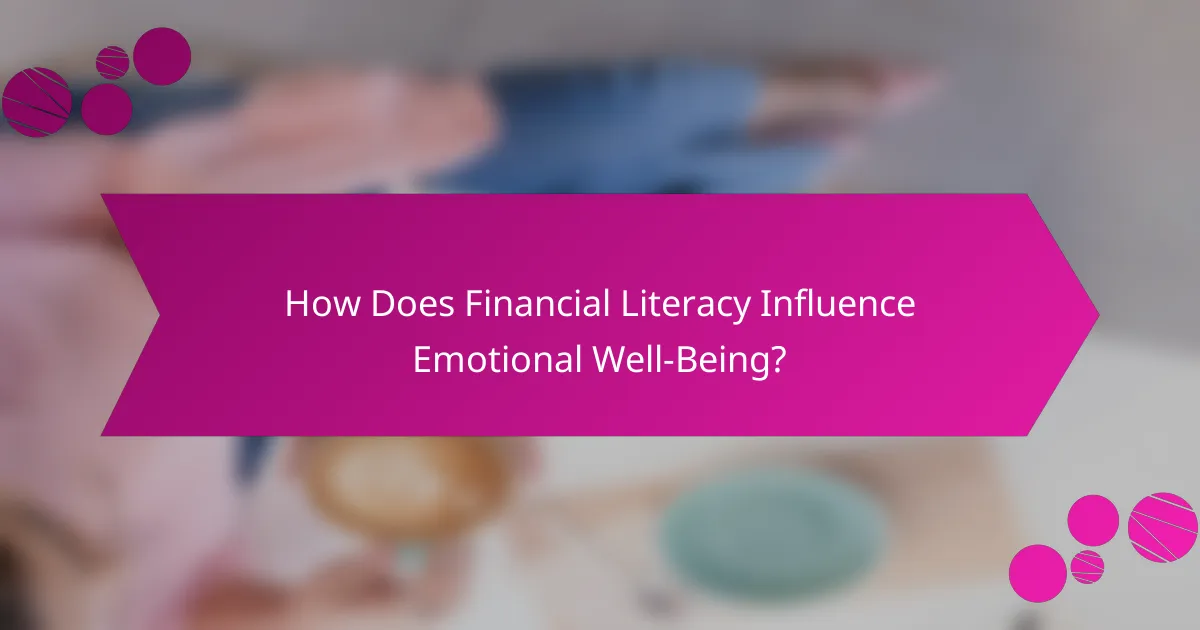
How Does Financial Literacy Influence Emotional Well-Being?
Financial literacy significantly enhances emotional well-being by reducing financial stress and promoting confidence. Individuals equipped with financial knowledge are better at managing their resources, leading to lower anxiety levels. Studies show that financial education correlates with improved mental health outcomes, as informed decision-making fosters a sense of control and security. As a result, financial literacy serves as a vital tool in enhancing overall emotional intelligence and well-being.
What Are the Psychological Effects of Financial Stress?
Financial stress can lead to anxiety, depression, and decreased overall well-being. Financial literacy enhances emotional intelligence, equipping individuals with skills to manage financial challenges effectively. Studies show that improved financial knowledge reduces stress levels significantly. For example, individuals trained in financial literacy report greater confidence in financial decisions, leading to better mental health outcomes.
How Can Financial Education Mitigate Anxiety?
Financial education can significantly reduce anxiety by empowering individuals with knowledge and skills. Understanding financial concepts allows for better decision-making, which directly alleviates stress related to money management.
Studies show that individuals with higher financial literacy experience lower levels of anxiety and improved emotional well-being. This connection arises because knowledge leads to confidence, enabling proactive financial planning and reducing uncertainty.
Moreover, financial education fosters emotional intelligence, helping individuals manage their emotions during financial challenges. By recognizing triggers and developing coping strategies, people can maintain a healthier mindset regarding their finances.
In summary, enhancing financial literacy serves as a powerful tool for mitigating anxiety, promoting a sense of control and stability in one’s financial life.
What Techniques Enhance Financial Decision-Making?
Improving financial decision-making involves enhancing financial literacy and emotional intelligence. These techniques reduce stress and promote well-being through informed choices.
Financial education provides individuals with knowledge about budgeting, investing, and saving, leading to better financial outcomes. Emotional intelligence helps individuals manage stress and make rational decisions rather than impulsive ones.
For example, individuals with high emotional intelligence are more likely to assess risks accurately and align their financial goals with personal values. This alignment fosters a sense of control and reduces anxiety related to financial decisions.
Incorporating both financial literacy and emotional intelligence into decision-making processes can significantly enhance overall financial well-being.
How Does Understanding Personal Finance Reduce Uncertainty?
Understanding personal finance reduces uncertainty by equipping individuals with knowledge to make informed decisions. Financial literacy enhances confidence in managing money, leading to reduced anxiety and improved emotional well-being. Individuals who grasp budgeting, saving, and investing can better navigate financial challenges, resulting in a stable financial future. This knowledge empowers proactive planning, minimizing stress associated with unexpected expenses.

What Unique Benefits Does Financial Literacy Offer?
Financial literacy uniquely reduces stress and enhances well-being by empowering individuals with knowledge. It fosters informed decision-making, leading to improved financial stability. This stability decreases anxiety related to money management and promotes a sense of control over one’s financial future. Furthermore, understanding financial concepts encourages proactive planning, which can lead to increased savings and investments, ultimately enhancing overall quality of life.
How Does Financial Knowledge Correlate with Life Satisfaction?
Financial knowledge significantly correlates with life satisfaction by reducing stress and enhancing well-being. Individuals with higher financial literacy experience lower anxiety levels related to money management, leading to improved emotional health. Studies indicate that financially educated people report greater life satisfaction due to better decision-making and planning skills. This education empowers individuals to navigate financial challenges effectively, fostering a sense of control and stability in their lives.
What Role Does Emotional Intelligence Play in Financial Decisions?
Emotional intelligence significantly influences financial decisions by enabling individuals to manage stress and make informed choices. Individuals with high emotional intelligence can better understand their emotions and those of others, leading to improved decision-making in financial contexts. This capability helps reduce impulsive spending and enhances long-term financial planning. Studies indicate that emotionally intelligent individuals are more likely to engage in financial literacy education, which further promotes financial well-being. By recognizing emotional triggers related to money, they can navigate financial challenges more effectively, ultimately leading to greater financial stability and improved overall well-being.
How Can Emotional Awareness Improve Financial Choices?
Emotional awareness significantly enhances financial choices by fostering better decision-making. Recognizing emotions helps individuals avoid impulsive spending and promotes thoughtful budgeting. Research indicates that emotionally intelligent individuals tend to prioritize long-term goals over short-term gratification, leading to improved financial stability. By integrating emotional awareness into financial literacy education, individuals can reduce stress and enhance overall well-being. This approach not only empowers better financial decisions but also cultivates a healthier relationship with money.
What Strategies Foster Resilience Against Financial Setbacks?
Financial literacy and emotional intelligence are crucial for building resilience against financial setbacks. Understanding financial concepts reduces anxiety, enabling better decision-making during crises.
Strategies include creating a budget, establishing an emergency fund, and improving financial knowledge through education. These actions enhance confidence and adaptability, fostering a proactive mindset.
Emotional intelligence plays a significant role in managing stress. Developing skills such as self-awareness and emotional regulation can lead to healthier responses to financial challenges.
As a result, individuals equipped with financial literacy and emotional intelligence are better prepared to navigate setbacks, ensuring long-term stability and well-being.
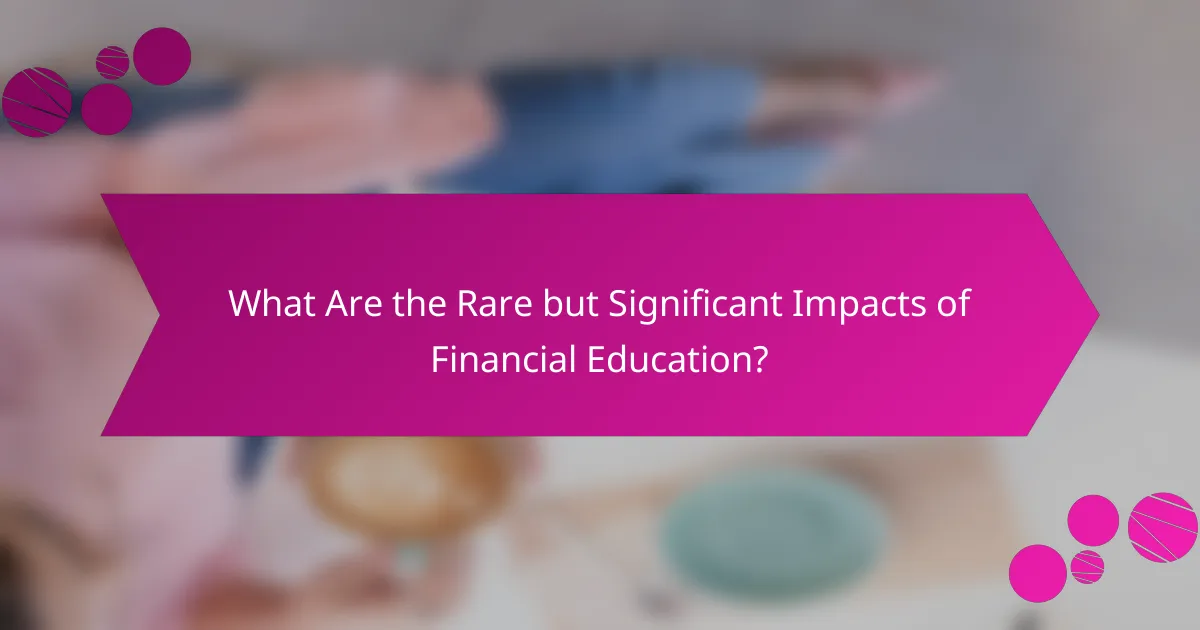
What Are the Rare but Significant Impacts of Financial Education?
Financial education significantly reduces stress and enhances well-being by fostering emotional intelligence. Rare impacts include increased resilience to financial shocks, improved decision-making under pressure, and enhanced interpersonal relationships. Studies show that individuals with high financial literacy report lower anxiety levels and greater life satisfaction. Additionally, financial education promotes proactive behaviors, such as budgeting and saving, which further contribute to emotional stability and overall well-being.
How Does Financial Literacy Affect Long-Term Mental Health?
Financial literacy significantly improves long-term mental health by reducing financial stress and enhancing emotional well-being. Individuals with strong financial knowledge experience less anxiety related to money management. This knowledge fosters confidence, enabling better decision-making and planning. Research indicates that financial education correlates with lower levels of depression and increased life satisfaction. Consequently, promoting financial literacy serves as a vital strategy for improving mental health outcomes.
What Unexpected Outcomes Arise from Financial Education Programs?
Financial education programs can lead to unexpected outcomes such as improved emotional intelligence and reduced stress levels. Participants often experience enhanced well-being through better financial decision-making and increased confidence. Additionally, these programs may foster community engagement and support networks, further promoting emotional resilience. As a result, financial literacy transcends mere money management, impacting overall life satisfaction.
How Can Community-Based Financial Education Initiatives Transform Lives?
Community-based financial education initiatives can significantly transform lives by enhancing financial literacy and emotional intelligence. These programs reduce stress and improve overall well-being through practical knowledge and skills.
Participants gain crucial financial skills, such as budgeting and saving, which empower them to make informed decisions. This knowledge directly correlates with reduced anxiety related to financial instability. According to studies, individuals with higher financial literacy report lower stress levels and improved emotional health.
Moreover, community initiatives foster a supportive environment, enabling participants to share experiences and strategies. This social reinforcement enhances emotional intelligence, allowing individuals to navigate financial challenges with resilience. As a result, these initiatives cultivate a sense of community and belonging, further contributing to personal well-being.
In summary, community-based financial education initiatives are vital in transforming lives by equipping individuals with essential financial skills and emotional resilience, leading to reduced stress and enhanced overall well-being.
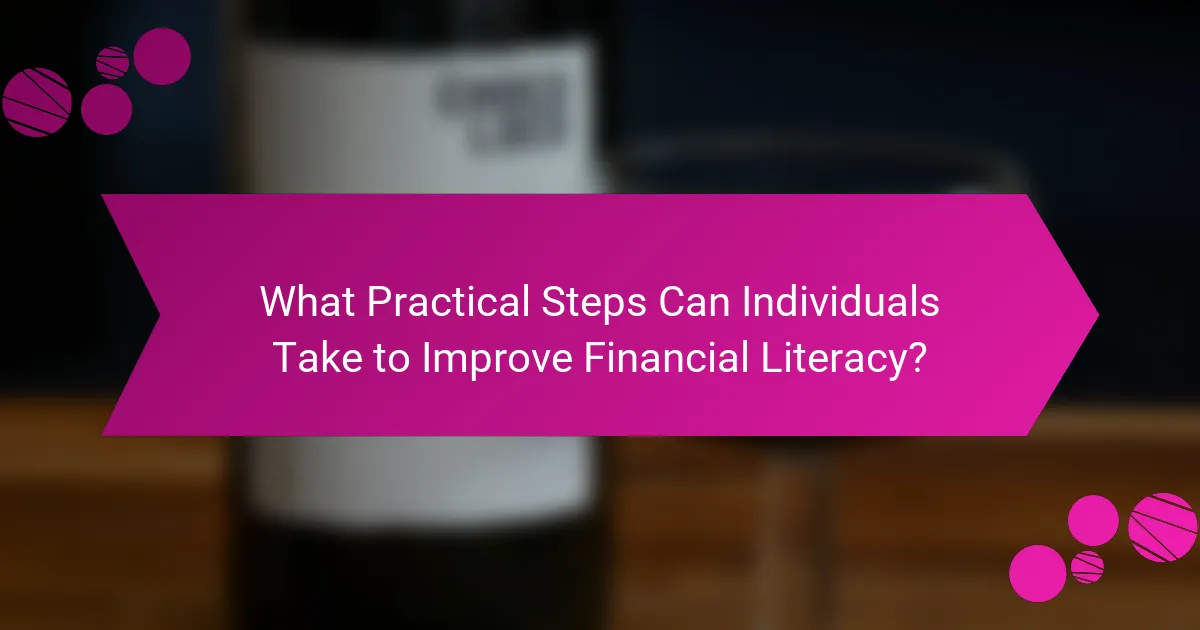
What Practical Steps Can Individuals Take to Improve Financial Literacy?
Improving financial literacy involves practical steps that enhance knowledge and emotional intelligence. Individuals can start by setting specific financial goals, creating and maintaining a budget, and educating themselves through books and online resources.
1. Identify financial goals: Define short-term and long-term objectives.
2. Create a budget: Track income and expenses to manage cash flow effectively.
3. Use educational resources: Read books, attend workshops, or take online courses to gain knowledge.
4. Practice emotional awareness: Recognize emotional triggers that affect financial decisions.
5. Join community groups: Engage with others to share experiences and strategies.
6. Regularly review progress: Assess financial health and adjust strategies as needed.
How Can One Create a Personal Financial Education Plan?
To create a personal financial education plan, identify your financial goals and assess your current financial literacy. Start by gathering resources such as books, online courses, and workshops focused on financial management. Set a timeline for learning specific topics like budgeting, saving, and investing. Regularly review your progress and adjust your plan as needed to ensure ongoing improvement. Engaging with a financial advisor can provide personalized insights and accountability.
What Resources Are Available for Enhancing Financial Knowledge?
Various resources enhance financial knowledge, integrating financial literacy and emotional intelligence. Online courses, workshops, and community programs provide structured learning. Books and podcasts offer diverse perspectives on managing finances and emotional well-being. Financial literacy apps deliver interactive tools for budgeting and tracking expenses. Professional counseling can address emotional aspects related to financial stress. Engaging with these resources fosters better decision-making and reduces anxiety, promoting overall well-being.
How to Identify Quality Financial Education Programs?
To identify quality financial education programs, focus on those that integrate emotional intelligence principles. Look for programs that emphasize practical applications, stress reduction techniques, and well-being enhancement. Consider the program’s accreditation, curriculum depth, and instructor qualifications. Programs that provide interactive learning experiences and measurable outcomes are often more effective.
What Common Mistakes Should Be Avoided in Financial Learning?
To enhance financial learning, avoid common mistakes like neglecting emotional intelligence, failing to set clear goals, and overlooking practical applications. Understanding emotions influences decision-making, while specific goals guide learning. Practical applications reinforce knowledge, making education more effective.
What Expert Tips Can Enhance Financial Literacy Effectively?
Enhancing financial literacy effectively requires integrating emotional intelligence into educational strategies. Focus on developing self-awareness and empathy to manage financial stress.
1. Identify personal financial emotions to understand spending habits.
2. Set clear financial goals to motivate informed decisions.
3. Practice mindfulness to reduce anxiety related to financial management.
4. Utilize educational resources that emphasize emotional aspects of finance.
5. Engage in discussions about money to build confidence and knowledge.
6. Seek mentorship to gain insights and emotional support in financial decisions.
